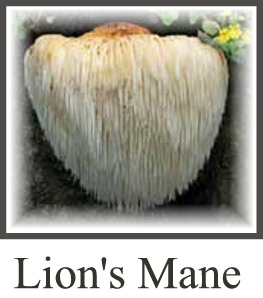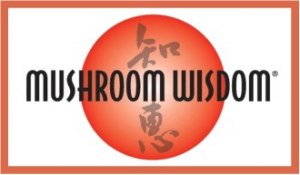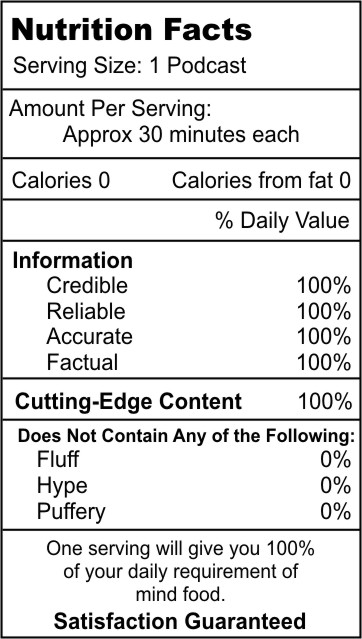Podcast: Play in new window | Download (Duration: 48:23 — 88.7MB)
Part 4 of 4 – Lion’s Mane Mushroom Enhances and Protects the Aging Brain
 In this last installment of our series on mushrooms, Mark will discuss the benefits of Lion’s Mane mushroom for brain health. This may be the most exciting of all of his interviews because of the important benefits that are being revealed through the science. There are very few products that have shown brain support for serious conditions like Alzheimer’s and dementia. WOW. There is emerging evidence that it may provide benefit for schizophrenia. This is a powerful interview.
In this last installment of our series on mushrooms, Mark will discuss the benefits of Lion’s Mane mushroom for brain health. This may be the most exciting of all of his interviews because of the important benefits that are being revealed through the science. There are very few products that have shown brain support for serious conditions like Alzheimer’s and dementia. WOW. There is emerging evidence that it may provide benefit for schizophrenia. This is a powerful interview.
Lion’s Mane Mushroom (Hericium erinaceus) .Named for its cascading tendrils, Lion’s Mane mushrooms have long been used in China and Japan to promote immune and digestive health. Recent research demonstrates that a substance in Lion’s Mane inhibits the formation of toxic peptide in brain cells.* Another substance stimulates the production of Nerve Growth Factor (NGF) in the brain.
 Bioactive constituents:
Bioactive constituents:
Hericenone A, B, C, D, E, F, G and H, Xylan, Heteroxylan, Heteroglucan, Proteoglycan
Bioactivities:
• Anti-alzheimer’s disease: Activates synthesis of nerve growth factor (NGF) / Prevents and ameliorates senile dementia
• Anti-tumor: Enhances immune functions / Cytotoxicity
• Digestive tonic: Treats stomach and duodenal ulcers and chronic atrophic gastritis / Improves indigestion
Lion’s Mane Extract has been studied and awarded a patent in Japan. Here is an excerpt from BioResearch Update
“April 3, 2013
Amycenone®, a proprietary extract developed from a mushroom called Lion’s Mane (Hericium erinaceus), has been awarded a patent in Japan. Its patent in the U.S. is pending.
Amyloban®3399, a dietary supplement containing Amycenone® as an active ingredient, has been widely used and a number of clinical cases have also been reported for its role in certain conditions such as benign or mild dementia, snoring, sleep apnea, low quality of sleeping, juvenile apathy syndrome and schizophrenia. Presentations on its clinical and laboratory studies have been made recently and a numbe r of articles on the original studies have been published on medical journals. The efficacy of the extract as introduced in such presentations and papers is persuasive as the active ingredients contained in the extract are explicitly identified and quantified, and the manufacturer has established the method of standardization to guarantee the actual content of these ingredients in their extract product.
Amycenone® has a patented ingredient that is confirmed to have an activity to increase the production of Nerve Growth Factor (NGF) in the brain as well as another ingredient to maintain healthy brain function by preventing nerve cell death by toxic amyloid β-peptide that is believed to be the cause of Alzheimer’s-type dementia. Furthermore, researchers are focusing on its potential activity of influencing the level of consciousness in the brain. Some promising results on the study may be coming soon.
So far, no significant adverse effects have been reported on the clinical uses of Amycenone®.”
When looking for a product that provides clinically studied benefits, look for trademarked and branded raw materials. Use those products in the dosages that were used in the studies and use it consistently for a long enough time to give the results. The best products are the ones that work best for you. You must try them in order to know how they will work for you. When looking for the best mushroom products, look to the companies that invest in the research and prove that their products are safe and effective. For more information, listen to our series on mushrooms with Mark Kaylor.
Part 1 of 4 – An Introduction to the World of Nutraceutical Mushrooms
Part 2 of 4 – Maitake Mushroom – D Fraction and Immune Support
Part 3 of 4 – Maitake SX Fraction Helps Maintain Healthy Blood Sugar
For more information: Go to BioResearch Update. BioResearch Update documents breakthrough research and insightful information about medicinal mushrooms. Here you can read about the clinical studies that can reveal some of these impressive benefits.
To review more studies go to PubMed, the government clearing house for clinical studies. There I found 272 references for maitake, 36 references for maitake d fraction, 31 references for SX fraction and 22 references for Lion’s Mane.
About Mark Kaylor
Mark J. Kaylor, Ph.D, C.N., M.H., is Vice President of Research & Education for Mushroom Wisdom. He has been a holistic healing practitioner and educator in southern California for 10 years. He has worked at a variety of levels in natural health retail, consulted with companies in formulating products and provided herbal training and formulas for national herbal extract manufacturers. In his efforts to share the gift of healing he has lectured internationally, written numerous articles, and appears frequently on radio and television.
Health Quest Podcast is sponsored by











{ 3 comments… read them below or add one }
Interesting read!
Hi Mark,
I have just had LASIK eye surgury and am experincing some mild dry eye symptoms. I have been reading about the optic nerves being cut by the laser during this procedure and never completely healing or reestablising themselves. I started reading about NGF and my train of thought is that I could use the Lion’s Mane mushroom to optimize healing in the optic nerve – to prevent dry eye and to facilitate healing in the optic nerves. I was curious as to your thoughts on this? Any infomation you could provide would be wonderful. Thank you, Karen
This is far outside my area of expertise and I don’t have the answer to your question. Sorry.